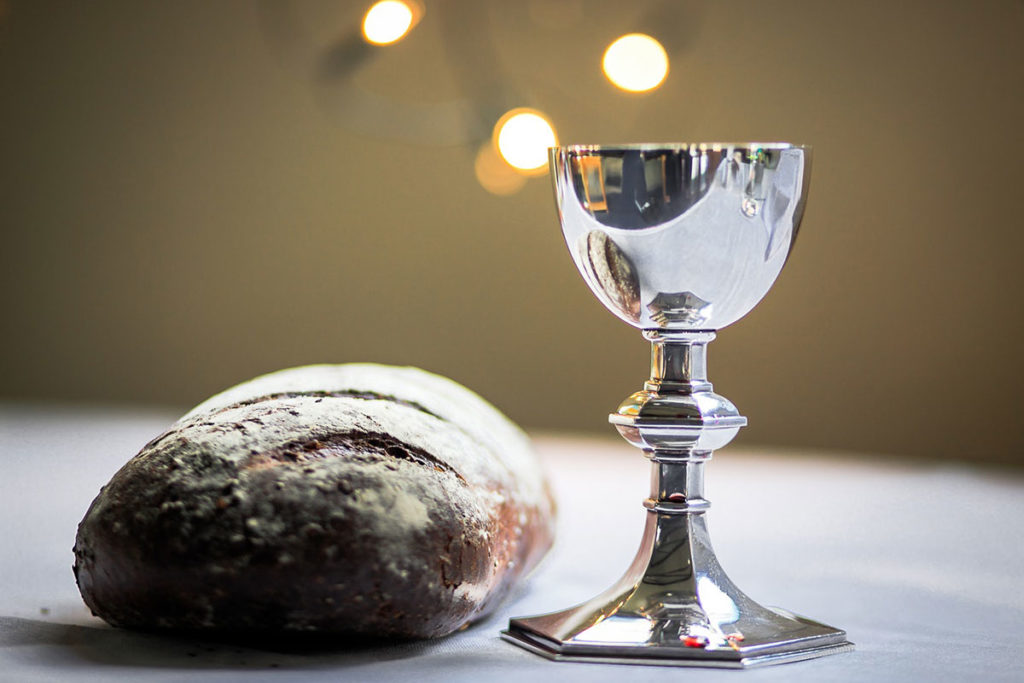Rev. Marianne Wells Borg
August 26, 2018
Proper 16/John 6:56-69
Trinity Episcopal Church, Bend Oregon
“It is the spirit that gives life; the flesh is useless.”
That’s what the author of John’s gospel has Jesus say today. Just two weeks ago John had Jesus say, “the life of the world is my flesh.”
Flesh and Blood Language
The life of the world is my flesh. And now, it is the spirit that gives life; the flesh is useless. How are we to put these two together? What are we to make of this? And this flesh and blood language. “Those who eat my flesh and drink my blood abide in me, and I in them.”
“This teaching is difficult,” complain the disciples. And so is the entire passage today as far as I’m concerned. So, what to say about this.
Body and blood. Flesh and spirit. I wonder if John isn’t deliberately pairing body and blood with flesh and spirit. I wonder if they say one and the same thing.
Without blood the body is dead. Whoever says death looks like sleep has not seen a dead person. When the blood no longer serves the body the difference in the flesh is stunning. Without blood pulsing through the body the body looks waxen. The body has no life in it. The body is inanimate.
Blood Gives the Body Life, As Does the Spirit
And just as the blood is to the body, so I think John is saying, is the spirit to the flesh. It animates it. Gives it life. Without spirit, the flesh is useless.
John isn’t saying the flesh doesn’t matter. After all, it is John’s gospel that so powerfully communicates the importance of incarnation. The wonder of being enfleshed. The wonder of being embodied. John’s Prologue brings us to the destination of his entire Gospel: the Word became flesh and dwelt among us. So, John can’t be saying the flesh is unimportant.
The Word Becomes Flesh
Let me take a moment to review in brief John’s prologue, to remind us how John starts his Gospel: “In the beginning was the Word, and the Word was with God, and the Word was God…. What has come into being in God was life, and the life was the light of all people. The light shines in the darkness, and the darkness did not overcome it… And the Word became flesh and lived among us.”
So, in the beginning was The Word. And the Word was God. And the Word became flesh. And lived among us. And the darkness did not overcome it.
Reason Ordering the Universe
The word “Word” used in the Prologue is the Greek word Logos. According to Greek thought, the Logos is the principle of “reason ordering the universe.” A very Greek understanding indeed. God, then, is the principle of reason ordering the universe. We are still influenced by Greek thought. But we know now that the universe is hardly a closed or predictable system, not subject to “reason,” and is full of endless possibilities.
John’s understanding of the word “Word” is not the same as the Greek understanding of Logos. For John the meaning of the word “Word” is rooted in a much older tradition. John was Jewish. And so was his community. For John, “Word” would better be represented by the Greek word Sophia than the Greek word Logos. Sophia means Wisdom. Which has a different dimension than “reasoned thought.” Wisdom comes from lived experience and empathic understanding. It is found down deep, within, within us. Wisdom is substantial and connected to how we live life here. And helps us discern and follow the best course. Greek thought turns “upward,” is abstracted in ideas, is less connected with the earth, and presupposes ideal forms. Greek thought tends toward hierarchical structure.
Understanding the Word “Word”
John’s experience and understanding of God is not that. And neither was Jesus’.
“What is felt in the body, in the heart, fuels the intellect.” (writes Marilyn McIntyre) Not the other way around.
John and Jesus were both deeply influenced by the Wisdom tradition embodied in the Prophets. The prophets spoke and acted in the way God might speak and act. From pathos and compassion. From heart and gut. With intensity and urgency. Always seeking the common good. Some say there are only three great themes: freedom, power and love. The Prophets addressed those three informed by justice, humility and kindness. The Prophets insisted they knew God. And in John’s Gospel to know God is eternal life. To know God, for John, is eternal life. The Prophets insisted that God’s Wisdom is the way. And the darkness will not overcome it.
The Word – Wisdom or Reasoned Thought?
Wisdom, then, is counter cultural, counter to “reasoned ordering.” Wisdom inspires counter-narratives that turn the tables of conventional currency upside down. The Word according to John reorients our thinking, always suggests a new thing and defies established order.
My use of the image turning over the tables. I choose it deliberately. John places the dramatic act of Jesus driving the money changers out of the temple and turning over the tables near the beginning of Jesus public ministry. The other Gospels put this action during the last week of Jesus’ life as the provoking incident that got him arrested. John uses this image or event as an early thematic marker. Jesus turns things upside down, changes our taken for granted ways of thinking, and does so provocatively.
The Word as God’s Wisdom
John is provocative himself in the way he talks about body and blood, spirit and flesh. The Word, God’s Wisdom is intended to upset us. In a good way. Destabilize us a bit. And get us to think. Open us to new possibilities. Possibilities that defy “conventional wisdom” and question “reasoned ordering.”
So, John begins his Gospel stating that Jesus is the Wisdom of God incarnate. Jesus embodies a counter-narrative, a counter-cultural Wisdom, the kind we see in the Prophets. And for John, the Wisdom of God is the Spirit at work in us. And without the Spirit our flesh is useless.
And then John has Jesus say: Those who eat my flesh and drink my blood abide in me and I in them. Graphic language. Offensive for some.
We Share Atoms
Walt Whitman has a phrase that I think mirrors this thought in John and might be easier to digest: “Every atom belonging to me as good belongs to you.” Every atom belonging to me as good belongs to you. You abide in me as I abide in you.
And what is it to abide? To abide is to conform, to adhere to, to stick to. To abide is to stand by, to act in accordance with.
Live the Wisdom of God
So, those who eat my flesh and drink my blood, those who enflesh and live the Wisdom of God, you who value the importance of your own incarnation and the difference you can make in the world, you stand with me. And I with you. Like beloveds.
I also want to remind us of the first public event of Jesus’ life according to the Gospel of John. John is a remarkable storyteller. He gives us so many important thematic clues early in his gospel to help us see what is yet to come around the bend.
The Third Day – Light Overcomes Darkness
The first public event of Jesus in John’s gospel is a wedding at Cana. No other Gospel has Jesus attending a wedding at Cana. Each Gospel writer provides his own distinct “inaugural act” or “inaugural address” of Jesus as it suits his purpose and intent. John chose a wedding as the first public activity of Jesus. He is more specific than that. The wedding happens on the third day. “On the third day,” John writes, “there was a wedding.”
The third day is a pivotal day in Scripture stories. And in the New Testament it is writ large as the day of resurrection. The day when the life in Jesus overcame the powers of death that felled him. When the light overcame the darkness. May every day be a third day.
Being in God is Essential
So John says God’s Wisdom becomes flesh. And dwells among us. In Jesus. And in us. Such Wisdom can turn the tables of our conventional ordering of things upside down. And right side up. Such Wisdom is abundant life. And the light of all people. Our relationship with God is likened to a wedding. It is a marriage of body and blood, spirit and flesh. It is intimate. And animate. Being in God is as essential for our life as food and drink. This is the great banquet. It is before us. Embody this knowing. Live it. Wed yourself to it.
And take. And eat.




This is a marvelous message. Thank you.
Hersh. Thanks for this. Stay in touch. Be well.
1 Corinthians 15:42-45 New Revised Standard Version (NRSV):
42 So it is with the resurrection of the dead. What is sown is perishable, what is raised is imperishable. 43 It is sown in dishonor, it is raised in glory. It is sown in weakness, it is raised in power. 44 It is sown a physical body, it is raised a spiritual body. If there is a physical body, there is also a spiritual body. 45 Thus it is written, “The first man, Adam, became a living being”; the last Adam became a life-giving spirit.
Danny. This is a powerful and suggestive verse from Paul. If there is a physical body there is also a spiritual body. For me as I continue to wonder about these things I see them as being one and the same. But that leaves the question of what happens to the “spiritual body” after the physical body is done. Tell me more about your thoughts about this verse. I welcome them.